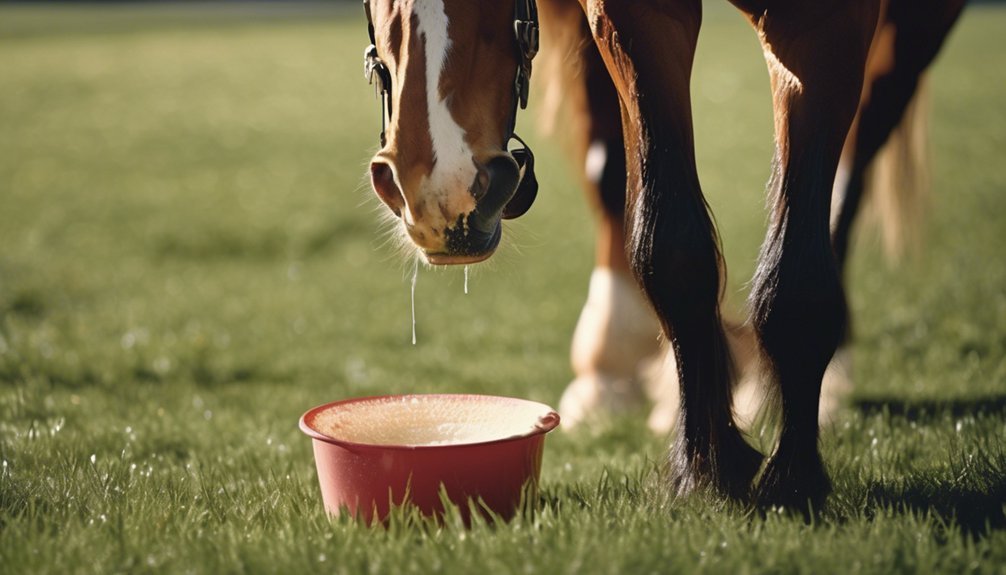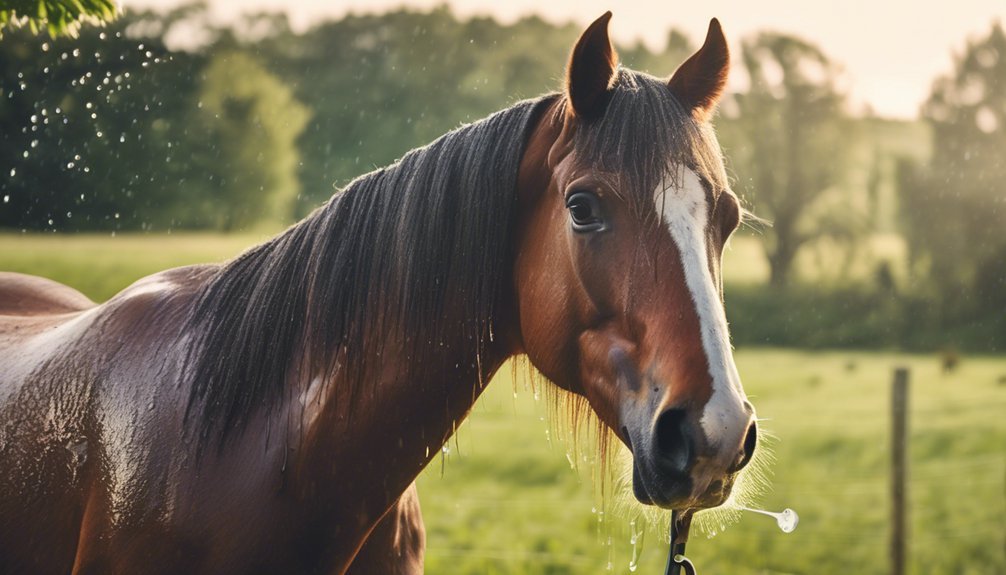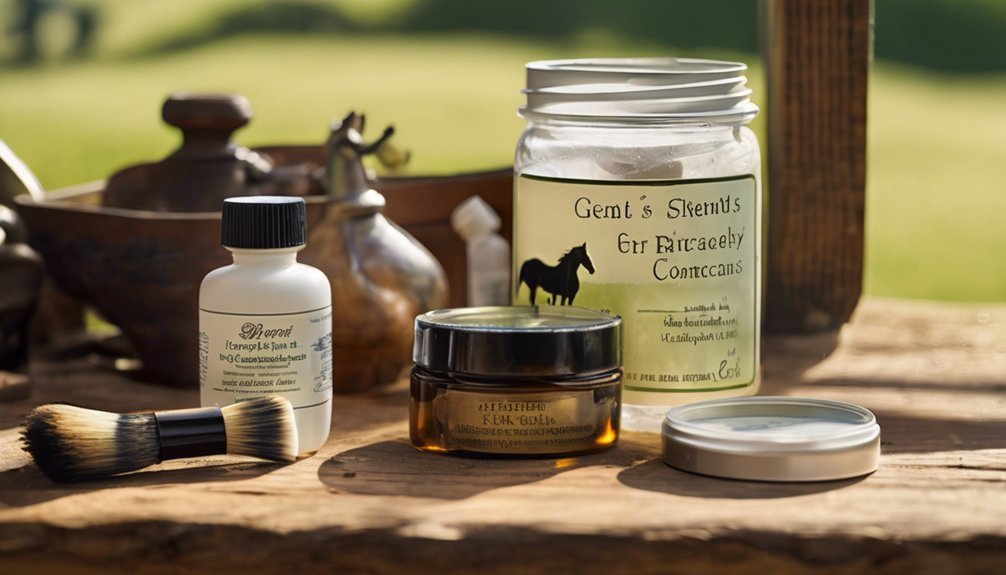
If you've ever noticed your horse scratching excessively or developing patches of irritated skin, you know how distressing skin allergies can be. These issues not only affect your horse's comfort but can lead to more serious health concerns if left untreated. Understanding how to prevent and manage these allergies is essential for every horse owner. Let's explore effective strategies that can help keep your horse's skin healthy and comfortable.
Key Takeaways
- Regularly inspect your horse's skin for signs of irritation, allowing for early detection and intervention of allergies.
- Maintain a clean environment by regularly changing bedding and minimizing dust and pollen exposure.
- Provide a balanced diet rich in omega fatty acids to support healthy skin and reduce allergic reactions.
- Use hypoallergenic shampoos during baths to remove allergens and soothe irritated skin effectively.
- Consult a veterinarian for personalized treatment plans, including topical creams or allergy medications as needed.
Understanding Horse Skin Allergies

Horse skin allergies can be a frustrating challenge for both you and your equine companion. Understanding the underlying allergy mechanisms is vital for effective management.
When your horse encounters allergens, its immune responses kick in, leading to inflammation and discomfort. These responses can manifest as itching, swelling, or rashes, making it essential to identify the specific triggers.
Your horse's immune system may overreact to normally harmless substances, causing these symptoms to arise. By recognizing these mechanisms, you can better navigate treatment options and preventive measures.
As you bond with your horse through this process, your compassionate approach will help alleviate their distress, fostering a healthier, happier relationship between you both.
Common Triggers and Causes
Identifying common triggers and causes of skin allergies in horses is key to effective management.
Pollen exposure from flowering plants can lead to allergic reactions, especially during spring and summer.
Dust mites, often lurking in bedding and hay, are another significant source of irritation.
Insect bites, particularly from flies and mosquitoes, can cause localized reactions that may escalate.
Additionally, feed allergies resulting from specific grains or additives can manifest as skin issues.
Environmental factors, like humidity and temperature, also play a role in aggravating allergies.
Lastly, be mindful of grooming products—some shampoos or conditioners may contain irritants that affect your horse's skin.
Recognizing Symptoms of Skin Allergies

How can you tell if your horse is suffering from skin allergies? Recognizing the symptoms is crucial for their comfort and health. Pay attention to these signs:
- Itchy Skin: If your horse is constantly scratching or rubbing against objects, it may indicate allergies.
- Hives Appearance: Look for raised bumps or welts on the skin, which can be a clear sign of an allergic reaction.
- Inflammation: Red, swollen patches can develop, indicating irritation and discomfort.
Monitoring these symptoms closely will help you respond promptly.
If you notice any of these signs, it's essential to consult with your veterinarian. Early intervention can make a significant difference in your horse's well-being and quality of life.
Preventative Measures for Healthy Skin
To maintain your horse's skin health, implementing preventative measures is essential, especially if they've previously shown signs of allergies.
Start by ensuring proper skin hydration; provide fresh water and consider adding supplements that promote skin wellness.
Regular inspections of your horse's skin can help you catch any early signs of irritation or infection. Look for any unusual bumps, redness, or dryness, and address these concerns immediately.
A well-balanced diet rich in omega fatty acids can also support overall skin health.
Finally, create a clean environment by regularly cleaning their living space to minimize allergens.
Grooming Techniques to Minimize Allergies

Effective grooming techniques play a crucial role in minimizing skin allergies in horses. By maintaining a consistent grooming routine, you can significantly reduce allergens and irritants on your horse's skin.
Here are three essential tips:
- Choose the Right Grooming Tools: Use soft-bristled brushes and curry combs to gently remove dust and debris without causing irritation.
- Establish a Bathing Frequency: Bathe your horse regularly, but don't overdo it. Aim for once every two weeks to prevent stripping natural oils while keeping allergens at bay.
- Check for Skin Issues: During grooming, always inspect your horse's skin for signs of irritation or allergies, allowing for timely intervention.
Nutritional Support for Skin Health
While grooming is essential, the right nutrition also plays a vital role in supporting your horse's skin health.
To keep your horse's skin resilient, focus on providing essential nutrients such as omega-3 fatty acids, zinc, and biotin. These help maintain a healthy coat and reduce sensitivity.
Consider adding dietary supplements rich in antioxidants, which combat inflammation and promote healing. Probiotics can also boost your horse's overall immune system, making it better equipped to handle allergens.
Always consult your veterinarian before introducing new supplements, ensuring they meet your horse's unique needs.
Treatment Options for Existing Allergies

When your horse develops skin allergies, prompt treatment can significantly improve their comfort and health.
Here are some effective options you can consider:
- Topical Treatments: Applying soothing creams or ointments can provide immediate relief. Look for products containing hydrocortisone or soothing natural ingredients like aloe vera.
- Allergy Medications: Antihistamines or corticosteroids, prescribed by your vet, can help reduce inflammation and itching, allowing your horse to feel more at ease.
- Bathing: Regularly bathing your horse with hypoallergenic shampoos helps remove allergens from their coat and skin, preventing further irritation.
When to Consult a Veterinarian
Recognizing the signs of skin allergies in your horse is important, but knowing when to consult a veterinarian can make all the difference in their recovery.
If you notice your horse scratching excessively, developing hot spots, or showing signs of swelling, it's time for a veterinary assessment. Don't wait until the condition worsens—early intervention can prevent further discomfort and complications.
Additionally, if your horse experiences severe reactions, such as difficulty breathing or hives, seek immediate help. A veterinarian can perform allergy testing to determine the underlying causes and recommend appropriate treatments tailored to your horse's needs.
Trust your instincts; when in doubt, it's always better to consult a professional for your horse's well-being.
Long-term Management Strategies

To effectively manage your horse's skin allergies over the long term, it's crucial to establish a comprehensive care routine that addresses both prevention and treatment.
Consider these key strategies:
- Environmental Adjustments: Regularly clean your horse's living area and remove potential allergens, like mold or dust.
- Dietary Support: Consult your vet about a balanced diet, possibly incorporating supplements that promote skin health.
- Immunotherapy Options: Discuss with your veterinarian the possibility of immunotherapy, which can help desensitize your horse to specific allergens over time.
Frequently Asked Questions
Can Horse Skin Allergies Be Hereditary?
Yes, horse skin allergies can be hereditary. If your horse has a genetic predisposition, hereditary factors might increase the likelihood of developing skin issues. Staying informed helps you manage and support your horse's health effectively.
Are Certain Breeds More Prone to Skin Allergies?
Certain breeds show increased susceptibility to skin allergies, experiencing allergy symptoms more frequently. It's essential to monitor your horse's health closely, as genetics and environmental factors can contribute to these challenging conditions. Your care makes a difference.
How Can Weather Affect Horse Skin Allergies?
Imagine your horse's skin as a delicate garden. Seasonal changes and humidity levels can nurture or disrupt that balance. You'll notice increased allergies during damp, warm weather, so stay vigilant and adapt your care.
Can Stress Contribute to Skin Allergies in Horses?
Yes, stress can definitely contribute to skin allergies in horses. Effective stress management helps minimize allergy triggers, ensuring your horse remains comfortable. Keep an eye on their environment to foster a calm, supportive atmosphere for their well-being.
Are There Holistic Remedies for Horse Skin Allergies?
While conventional methods often fail, herbal treatments and dietary adjustments can nurture your horse's skin health. Embracing these holistic remedies may provide relief, fostering a deeper connection between you and your beloved companion.
Conclusion
By taking proactive steps to prevent and manage skin allergies in your horse, you're not just addressing symptoms; you're enhancing their overall well-being. Imagine your horse, free from discomfort, happily trotting through a clean pasture, their coat shining with health. While it may seem challenging at times, remember that with the right care, you can significantly reduce allergic reactions and ensure a happier, healthier life for your equine friend. Don't hesitate to reach out for veterinary support when needed.





